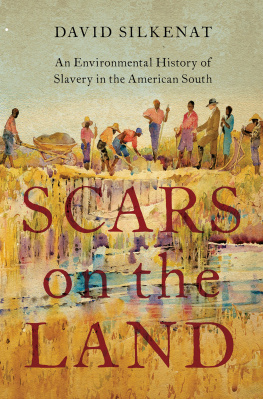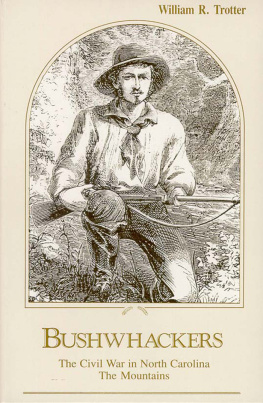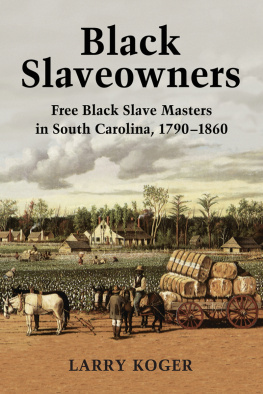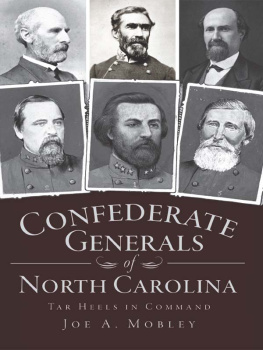DRIVEN FROM HOME

SERIES EDITORS
Stephen Berry
University of Georgia
Amy Murrell Taylor
University of Kentucky
ADVISORY BOARD
Edward L. Ayers
University of Richmond
Catherine Clinton
University of Texas at
San Antonio
J. Matthew Gallman
University of Florida
Elizabeth Leonard
Colby College
James Marten
Marquette University
Scott Nelson
College of William & Mary
Daniel E. Sutherland
University of Arkansas
Elizabeth Varon
University of Virginia
Driven from Home
North Carolinas Civil War Refugee Crisis
DAVID SILKENAT

2016 by the University of Georgia Press
Athens, Georgia 30602
www.ugapress.org
All rights reserved
Set in Berthold Baskerville by Graphic Compostion, Inc.
Most University of Georgia Press titles are
available from popular e-book vendors.
Printed digitally
Library of Congress Control Number: 2016949296
ISBN 978-0-8203-4946-6 (hardcover: alk. paper)
ISBN 978-0-8203-4947-3 (e-book)
CONTENTS
ACKNOWLEDGMENTS
I began this book in 2010 at my dining room table in Fargo, North Dakota, when I was teaching at North Dakota State University. The blizzards and subzero temperatures outside my window presented a very different picture than the somewhat more temperate North Carolina environ I was trying to re-create on the page. I finished revising this book in 2015 in my office in Edinburgh, Scotland, an even greater remove from the Tar Heel State. The distances, both physical and metaphorical, between those locales helped me to empathize, at least in a small way, with many of the individuals I was writing about. Although Ive been lucky enough never to have been a refugee, I did manage to live a somewhat peripatetic life while writing this book.
I have benefited from a number of generous grants that allowed me to do the archival work that made this book possible. An Archie K. Davis Fellowship from the North Caroliniana Society, a Guion Griffis Johnson Visiting Scholar Grant from the University of North Carolinas Southern Historical Collection, and a Hendrickson Faculty Development Award from North Dakota State University allowed me to spend two summers in North Carolina archives. An Andrew W. Mellon Fellowship from the Huntington Library allowed me to spend a restful month researching and writing. As with most historical works, the archivists are the unsung heroes who make the research possible. For special praise, I wanted to single out the robust help of Laura Clark Brown and Matt Turi at UNCs Southern Historical Collection and Chris Meekins at the North Carolina State Archives.
This book has benefited from innumerable conversations with friends and colleagues. A radically incomplete list of those whose thoughts and comments have helped me along the way include Bruce Baker, David Blight, Judkin Browning, Karl Campbell, Catherine Clinton, Frank Cogliano, John Cox, Adam Domby, Owen Dudley Edwards, Susan-Mary Grant, Hilary Green, Matt Harper, Mark Harvey, Fabian Hilfrich, Michael Hill, Tom Isern, Anya Jabour, Suzzanne Kelley, Kelly Kennington, Bill Link, Robert Mason, Cecelia Moore, Barton Myers, Megan Kate Nelson, Larry Peterson, Paul Quigley, Angela Smith, John David Smith, Diane Miller Sommerville, Harry Watson, and Tim Williams. I owe a particular debt to Fitz Brundage, who has continued to provide sage counsel long after I left graduate school. Steve Berry has been a constant supporter of my work and has been invaluable in transforming my often inchoate thoughts into something worth reading.
My family has been more indulgent with me than I deserve during the writing of this book. My father and my parents-in-law have been, as always, very supportive of me and my work. My darling wife, Ida, has not only given me her unconditional love and the time and space to research and write this book but also carefully read the manuscript, catching many poor turns of phrase. My most significant regret in writing this book is that time I spent working on it could have been spent with her and our children, Chamberlain, Dawson, and Thessaly. This book is dedicated to them.
DRIVEN FROM HOME
Introduction
On May 7, 1864, the Mercury, a Raleigh, North Carolina, weekly magazine, published the first part of a novelette titled The Refugees Niece. The author, William D. Herrington, a soldier in the Third North Carolina Cavalry, claimed that his story was Founded on Real Incidents of the War in North Carolina. Herrington would later publish three other novelettes in the Mercury, two of which, The Captains Bride and The Deserters Daughter, would eventually also be published as freestanding volumes. The titular refugee in Herringtons story was Mr. Holmes, a respectable citizen, and a true southerner at heart, who at the fall of Newbern [North Carolina] had taken refuge here within the Confederate lines to avoid that inhuman brutality that the enemy were in the habit of inflicting upon such non-combatants as were so unfortunate as to fall within their jurisdiction. Holmes had moved to the North Carolina Piedmont with his orphaned nineteen-year-old niece Annie, who possessed a sylph-like form, with raven black hair, dark eyes, and rosey cheeks. The plot of The Refugees Niece centered on a love triangle involving Annie and two Confederate soldiers who vied for her affection. Unfortunately, the issue of the Mercury that contained the concluding half of The Refugees Niece has not survived, so we do not know how Annie Holmess romance resolved itself. Although the plot was hackneyed, the prose awkward, and the spelling and grammar poor, The Refugees Niece was a popular success, making Herrington a minor Confederate literary phenomenon. Both set and published in the North Carolina Piedmont, The Refugees Niece reverberated with readers because so many of them saw themselves in its pages. By March 1864 thousands of refugees had
Exactly one hundred years after the publication of Herringtons The Refugees Niece, historian Mary Elizabeth Massey published her study of Confederate refugees, Refugee Life in the Confederacy. Born in 1915, Massey was one of the most prominent female Civil War historians of her generation. After receiving her doctorate at the University of North Carolina, Massey taught for more than two decades at Winthrop College in Rock Hill, South Carolina. Massey had the distinctions of being the only woman to serve on the Advisory Council for the Civil War Centennial Commission and, in 1972, becoming the third woman president of the Southern Historical Association. Over the course of her scholarly career, Massey published ten articles and three books, among which Refugee Life has had the most significant and lasting influence. Massey published Refugee Life in 1964, at the height of the Civil War centennial observations. The product of more than ten summers of research, Masseys original manuscript ran to 664 pages, too long even by the standards of the day, which seemed to embrace Civil War tomes. After being prodded by her editor at Louisiana State University Press, Massey pruned the text to 370 pages. According to her preface, Masseys original intention was to examine all groups uprooted by the warConfederate and Union sympathizers, Negroes, Indians, and whites. However, Massey was advised by several authorities, whose opinions I value and respect, that such a project would prove unwieldy, and she therefore restricted her study to Confederate sympathizers who spent the war years trying to stay within the contracting Confederacy. If her acknowledgments provide any clue, those authorities who urged Massey to restrict her study to white Confederates included some of the most notable Civil War historians of the era, including Bell I. Wiley, Fletcher Green, T. Harry Williams, and David Donald. Although Massey attempted to include the experiences of Confederate refugees from a variety of social backgrounds, she admitted that her sources biased her study toward the upper-class refugee experience.
Next page






